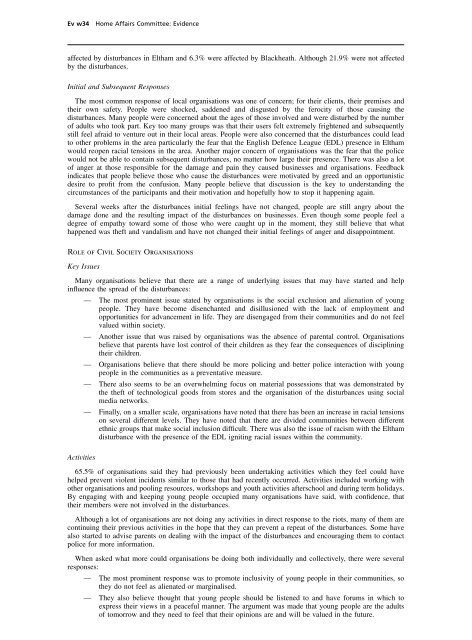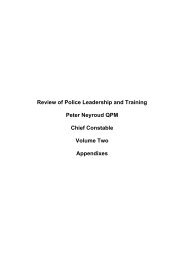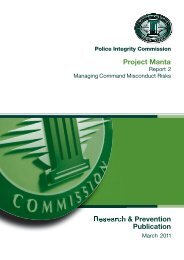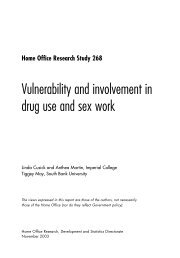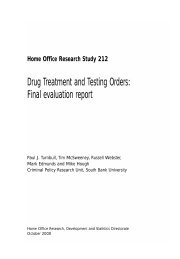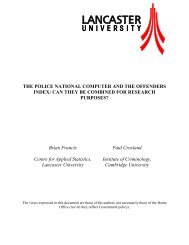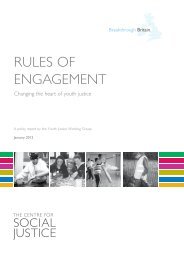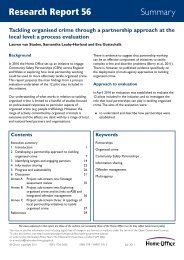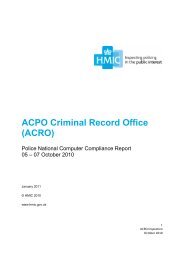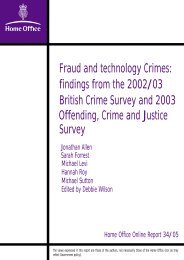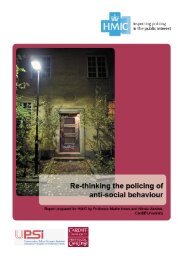Policing Large Scale Disorder: Lessons from the disturbances of ...
Policing Large Scale Disorder: Lessons from the disturbances of ...
Policing Large Scale Disorder: Lessons from the disturbances of ...
You also want an ePaper? Increase the reach of your titles
YUMPU automatically turns print PDFs into web optimized ePapers that Google loves.
Ev w34 Home Affairs Committee: Evidence<br />
affected by <strong>disturbances</strong> in Eltham and 6.3% were affected by Blackheath. Although 21.9% were not affected<br />
by <strong>the</strong> <strong>disturbances</strong>.<br />
Initial and Subsequent Responses<br />
The most common response <strong>of</strong> local organisations was one <strong>of</strong> concern; for <strong>the</strong>ir clients, <strong>the</strong>ir premises and<br />
<strong>the</strong>ir own safety. People were shocked, saddened and disgusted by <strong>the</strong> ferocity <strong>of</strong> those causing <strong>the</strong><br />
<strong>disturbances</strong>. Many people were concerned about <strong>the</strong> ages <strong>of</strong> those involved and were disturbed by <strong>the</strong> number<br />
<strong>of</strong> adults who took part. Key too many groups was that <strong>the</strong>ir users felt extremely frightened and subsequently<br />
still feel afraid to venture out in <strong>the</strong>ir local areas. People were also concerned that <strong>the</strong> <strong>disturbances</strong> could lead<br />
to o<strong>the</strong>r problems in <strong>the</strong> area particularly <strong>the</strong> fear that <strong>the</strong> English Defence League (EDL) presence in Eltham<br />
would reopen racial tensions in <strong>the</strong> area. Ano<strong>the</strong>r major concern <strong>of</strong> organisations was <strong>the</strong> fear that <strong>the</strong> police<br />
would not be able to contain subsequent <strong>disturbances</strong>, no matter how large <strong>the</strong>ir presence. There was also a lot<br />
<strong>of</strong> anger at those responsible for <strong>the</strong> damage and pain <strong>the</strong>y caused businesses and organisations. Feedback<br />
indicates that people believe those who cause <strong>the</strong> <strong>disturbances</strong> were motivated by greed and an opportunistic<br />
desire to pr<strong>of</strong>it <strong>from</strong> <strong>the</strong> confusion. Many people believe that discussion is <strong>the</strong> key to understanding <strong>the</strong><br />
circumstances <strong>of</strong> <strong>the</strong> participants and <strong>the</strong>ir motivation and hopefully how to stop it happening again.<br />
Several weeks after <strong>the</strong> <strong>disturbances</strong> initial feelings have not changed, people are still angry about <strong>the</strong><br />
damage done and <strong>the</strong> resulting impact <strong>of</strong> <strong>the</strong> <strong>disturbances</strong> on businesses. Even though some people feel a<br />
degree <strong>of</strong> empathy toward some <strong>of</strong> those who were caught up in <strong>the</strong> moment, <strong>the</strong>y still believe that what<br />
happened was <strong>the</strong>ft and vandalism and have not changed <strong>the</strong>ir initial feelings <strong>of</strong> anger and disappointment.<br />
Role <strong>of</strong> Civil Society Organisations<br />
Key Issues<br />
Many organisations believe that <strong>the</strong>re are a range <strong>of</strong> underlying issues that may have started and help<br />
influence <strong>the</strong> spread <strong>of</strong> <strong>the</strong> <strong>disturbances</strong>:<br />
Activities<br />
— The most prominent issue stated by organisations is <strong>the</strong> social exclusion and alienation <strong>of</strong> young<br />
people. They have become disenchanted and disillusioned with <strong>the</strong> lack <strong>of</strong> employment and<br />
opportunities for advancement in life. They are disengaged <strong>from</strong> <strong>the</strong>ir communities and do not feel<br />
valued within society.<br />
— Ano<strong>the</strong>r issue that was raised by organisations was <strong>the</strong> absence <strong>of</strong> parental control. Organisations<br />
believe that parents have lost control <strong>of</strong> <strong>the</strong>ir children as <strong>the</strong>y fear <strong>the</strong> consequences <strong>of</strong> disciplining<br />
<strong>the</strong>ir children.<br />
— Organisations believe that <strong>the</strong>re should be more policing and better police interaction with young<br />
people in <strong>the</strong> communities as a preventative measure.<br />
— There also seems to be an overwhelming focus on material possessions that was demonstrated by<br />
<strong>the</strong> <strong>the</strong>ft <strong>of</strong> technological goods <strong>from</strong> stores and <strong>the</strong> organisation <strong>of</strong> <strong>the</strong> <strong>disturbances</strong> using social<br />
media networks.<br />
— Finally, on a smaller scale, organisations have noted that <strong>the</strong>re has been an increase in racial tensions<br />
on several different levels. They have noted that <strong>the</strong>re are divided communities between different<br />
ethnic groups that make social inclusion difficult. There was also <strong>the</strong> issue <strong>of</strong> racism with <strong>the</strong> Eltham<br />
disturbance with <strong>the</strong> presence <strong>of</strong> <strong>the</strong> EDL igniting racial issues within <strong>the</strong> community.<br />
65.5% <strong>of</strong> organisations said <strong>the</strong>y had previously been undertaking activities which <strong>the</strong>y feel could have<br />
helped prevent violent incidents similar to those that had recently occurred. Activities included working with<br />
o<strong>the</strong>r organisations and pooling resources, workshops and youth activities afterschool and during term holidays.<br />
By engaging with and keeping young people occupied many organisations have said, with confidence, that<br />
<strong>the</strong>ir members were not involved in <strong>the</strong> <strong>disturbances</strong>.<br />
Although a lot <strong>of</strong> organisations are not doing any activities in direct response to <strong>the</strong> riots, many <strong>of</strong> <strong>the</strong>m are<br />
continuing <strong>the</strong>ir previous activities in <strong>the</strong> hope that <strong>the</strong>y can prevent a repeat <strong>of</strong> <strong>the</strong> <strong>disturbances</strong>. Some have<br />
also started to advise parents on dealing with <strong>the</strong> impact <strong>of</strong> <strong>the</strong> <strong>disturbances</strong> and encouraging <strong>the</strong>m to contact<br />
police for more information.<br />
When asked what more could organisations be doing both individually and collectively, <strong>the</strong>re were several<br />
responses:<br />
— The most prominent response was to promote inclusivity <strong>of</strong> young people in <strong>the</strong>ir communities, so<br />
<strong>the</strong>y do not feel as alienated or marginalised.<br />
— They also believe thought that young people should be listened to and have forums in which to<br />
express <strong>the</strong>ir views in a peaceful manner. The argument was made that young people are <strong>the</strong> adults<br />
<strong>of</strong> tomorrow and <strong>the</strong>y need to feel that <strong>the</strong>ir opinions are and will be valued in <strong>the</strong> future.


